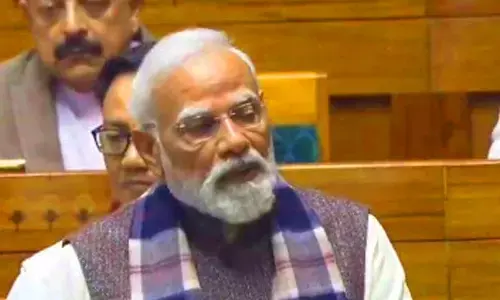Sales of savings certificates in Bangladesh touch 144.28 bn taka amid corona

Sales of savings certificates in Bangladesh touch 144.28 bn Tk amid corona (Photo/IANS)
Even as economic activities in Bangladesh have taken a hit due to the coronavirus pandemic, the revenue brought to the exchequer through the sales of savings certificates has gladdened the officials no end.
Dhaka: Even as economic activities in Bangladesh have taken a hit due to the coronavirus pandemic, the revenue brought to the exchequer through the sales of savings certificates has gladdened the officials no end.
Witnessing a sudden jump in June, the last month of the Bangladeshi fiscal, the sales of savings certificates touched a total of 144.28 billion Bangladeshi takas (Tk).
Bangladesh Prime Minister Sheikh Hasina's government is also bringing various savings schemes for non-resident Bangladeshis (NRBs), said Atiur Rahman, a former Governor of the Central Bank.
The government has offered special schemes to women and senior citizens. Most of the women have bought these savings certificates.
"While people are drowned in financial insecurity for the last five months, mostly women and senior citizens are coming forward to buy National Savings Certificates, which means that the people of Bangladesh see it as a social security scheme," pointed out top researchers and economists of Bangladesh.
Atiur said that the pro-people initiative of Sheikh Hasina is ensuring the security of the people's money.
"This is a very good aspect. Due to this, many expatriates are becoming interested in holding savings in their native country. Its beneficiaries are buying savings certificates extensively. The returns on the National Savings Certificates in Bangladesh is much higher than the Fixed Deposit Receipts (FDRs)," Atiur said.
Because the rate of interest is good, a large number of people are interested in putting their money in NSCs, said the former Governor of Bangladesh Bank.
Bangladesh had recorded its highest sales in savings certificates at 97.26 billion Tk in January 2020.
Atiur pointed to the possible reasons for the increase in sales of savings certificates -- a record rise in remittance inflow and higher interest rates.
He said that investors get only 6 per cent interest on Deposit Premium Scheme (DPS) in a bank, while savings certificates yield up to 11.5 per cent interest.
Also, many people consider depositing money in banks a risky venture.
"So, everyone may be investing in savings certificates considering that it is a safe investment," said Atiur, who is a well-known economist in Bangladesh.
Another economist, Abul Barkat, said: "Yes, people feel secure in buying NSCs. The low-interest rates on bank deposits and a long-term slump in the stock markets have led to a jump in the sale of savings certificates in the past few years, subsequently putting pressure on the Bangladesh government that pays interest on the investment."
Remittance inflow, which has pushed Bangladesh's foreign currency reserves past $38 billion for the first time in history, has also played a big role in increasing the sale of NSCs, Barkat opined.
To relieve some pressure, the Bangladesh government had doubled the tax at source on investments in savings certificates to 10 per cent in July last year.
It also made Tax Identification Number or TIN, bank account, and some other documents mandatory for buying the savings certificates. This move did drag the sales down, and finally, as the pandemic hit Bangladesh in March, the sales dropped to 6.61 billion Tk in April.
The government had paid the customers 12.83 billion Tk in that month.
The government had set a target of borrowing 270 billion Tk through sales of savings certificates in the 2019-20 fiscal, but revised it down to 119.24 billion Tk after the sales dropped.
"There is no universal pension scheme in our country. NSCs offer a great opportunity for saving for those abroad, who are not government officials, or are unemployed, or in the private sector, or housewives, or pensioners," Atiur added.
Those who have lots of money are not just buying NSCs, but also gold and silver, Barkat pointed out.
Yet, the interest on savings certificates is the highest and guaranteed, he added.

















